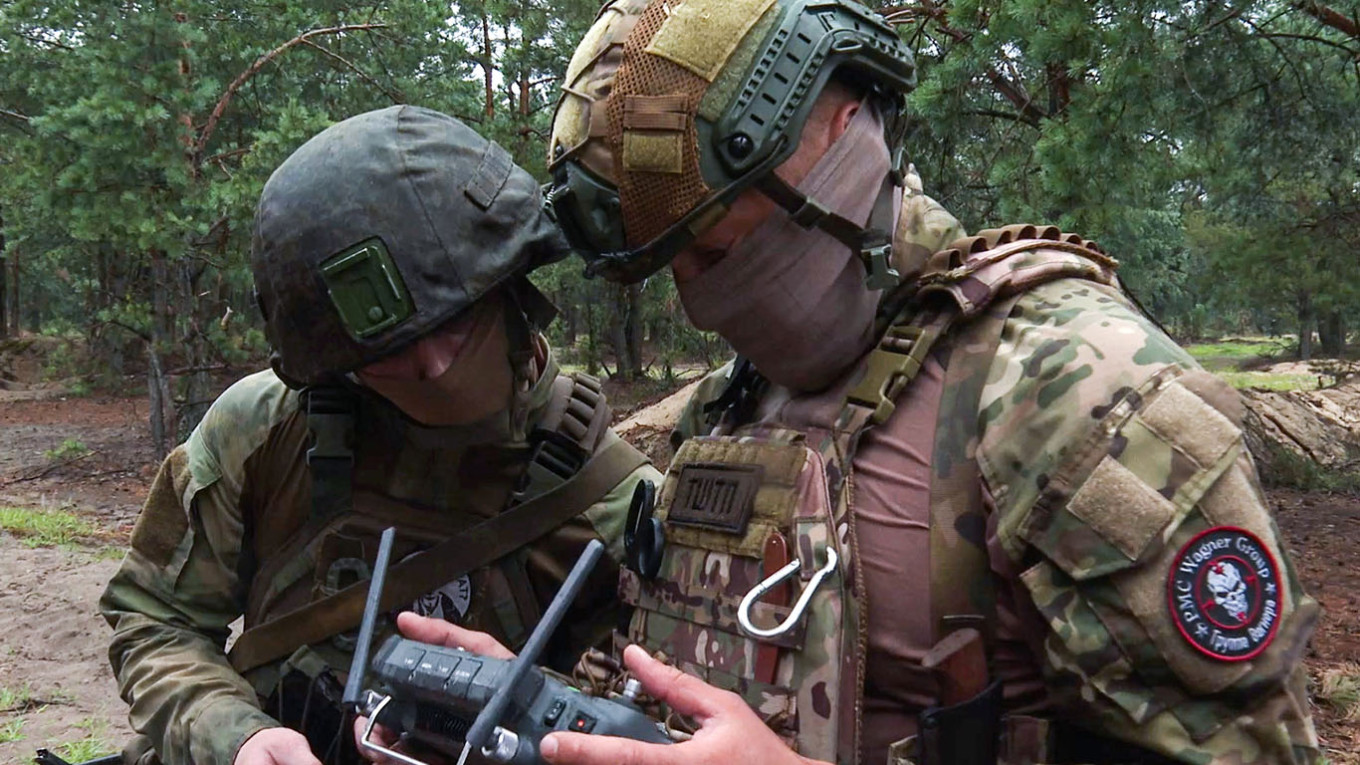Alexander Platov was incarcerated for the murder of his wife when an unexpected chance came his way. In 2022, he was recruited by the Wagner mercenary group to participate in Russia’s invasion of Ukraine in exchange for a pardon. Half a year later, he regained his freedom.
However, struggling to adapt to life outside prison, Platov re-signed a contract with the Defense Ministry and returned to the battlefield by late 2024. This time, though, he and other former inmates were regarded as expendable.
After enduring a suicide attack and suffering serious injuries from shrapnel, Platov shared his experience with The Moscow Times.
While The Moscow Times was unable to independently verify every detail of Platov’s story, reports from exiled media and various Russian and Ukrainian sources support several aspects of his account.
The Defense Ministry did not respond promptly to The Moscow Times’ request for commentary.
“Life outside was tough. I’m a f***ing convict; everyone knew I had been incarcerated multiple times. Plus, I have a reputation for enjoying a drink. I thought I would be hailed as a hero after fighting in Ukraine, but they treated me like trash,” Platov, 35, recounted.
Platov was born in the late 1980s into a struggling family in Ulyanovsk, a city along the Volga River, and first encountered the law at the age of 17.
“I was imprisoned for car theft. Eight years. After that, I married, but she betrayed me. I ended up stabbing her, receiving thirteen more years. That’s when Wagner came into play,” he recalled.
In October 2022, Wagner’s chief Yevgeny Prigozhin arrived at the prison yard by helicopter to directly recruit inmates.
“We didn’t take him seriously,” Platov remembered. “I spoke back, and then the guards pulled me aside. Uncle Zhenya [Prigozhin] twisted my ear and told me, ‘Join Wagner or rot here.’ You know, in prison, inmates were desperate to get out. I joined for freedom, and the pay was decent, but I also wanted to expiate my sins with blood and sweat.”
Yuri Borovskikh, a human rights advocate from the organization Rus Sidyashchaya (Russia Behind Bars), noted that Prigozhin recruited around 50,000 inmates into Wagner during the conflict. He added that since the Defense Ministry took over the recruitment of prisoners from Wagner in early 2023, more than 100,000 convicts have been enlisted.
As a member of Wagner, Platov led a reconnaissance team in Bakhmut.
“I received a silver medal for bravery from Putin. Can you believe it — after two serious convictions? They granted me veteran status. When I returned, I bought a house and found a job, but nobody respected me. People thought I was just trying to save face and that I bought the medal. So, I returned to the enlistment office and signed another contract — to ‘defend the Motherland’ — or so I believed.”
Borovskikh mentioned that individuals like Platov often deal with compounded trauma. Many re-offend, find themselves back in prison, only to sign up for military service once again.
After signing a contract with the Defense Ministry, Platov was deployed near the Ukrainian stronghold of Pokrovsk, leading a storm group within the 110th Motor Rifle Brigade.
“The Defense Ministry threw us into this militia like dogs. Officially, it’s spetsnaz. In reality, they’re sending former convicts and veterans from Chechnya. No retreats, no vacations. Maybe you’ll see one in two years if they manage to identify your skeleton,” he said.
The treatment Platov described aligns with how new recruits are currently handled. Borovskikh explained that military contracts for prisoners now last until the war concludes, and those who enlist possess virtually no rights.
“There are various penal battalions, like this brigade or Storm Z. Most of those involved have no families. Their lives rest entirely in the hands of their commanders. Experienced fighters may be valuable. The rest? Just cannon fodder,” Borovskikh stated.
Platov feels that the 110th Brigade exists, in some ways, to “punish” former Wagner fighters.
“There aren’t any real Wagner fighters here, just ex-cons, the leftovers. If the actual Wagner units came back from Africa or Belarus, Ukraine would be severely threatened. Russia would too,” he asserted. “All they provided us was a rifle. We had to purchase everything else ourselves, from underwear to helmets. Our salaries, ranging from 210,000 to 250,000 rubles ($2,300 to $2,750), were quickly consumed by food, equipment, and essentials. You survive however you can.”
Platov noted that the brigade made no gains near Pokrovsk. His initial mission was to capture the village of Zelene Pole, which his platoon accomplished. Then came a rotation of forces.
“They sent in replacements: naval infantry. Contract soldiers from the Black Sea Fleet, which basically no longer exists. Twenty-five ships have sunk,” he said. “One marine hadn’t touched a rifle since he swore in 20 years ago. They told him he’d be guarding kindergartens in Donetsk.”
Instead, he recounted, the marines were thrust into the frontline forests armed only with basic assault rifles and two magazines each. Shortly after their arrival, an American Bradley fighting vehicle approached, opened fire from 200 meters, deployed troops, and decimated the detachment before retreating.
“They [the Ukrainians] didn’t even bother to occupy our position,” Platov added. “If they had realized how dire things were, they could have captured all three of our lines.”
The next mission proved disastrous for Platov’s comrades and nearly cost him his life as well. He did not blame the enemy but pointed to the ineptitude and brutality of his own commanders.
The platoon was dropped off 25 kilometers ahead of friendly lines near Ocheretyne, with no support and scant supplies.
“We were told to bring our own food and water. I led the storm group, but we never reached enemy positions,” he explained.
Three members remained behind to maintain communication while the rest advanced and were decimated.
“The command told us to advance with a drone guiding us. I asked, ‘Which drone? There are three enemy drones to our right and two to the left. Are you crazy?’ They replied, ‘If you don’t move right now, our own kamikaze drone will hit your trench.’ So we rushed forward and didn’t even reach the contact line before Ukrainian drones attacked us,” he detailed.
Platov suffered injuries to both legs, his back, and his spine. There was no medical evacuation.
“I crawled for four days, covering 25 kilometers. Only two of us survived from nine. We used bottles for urine, took antiviral meds, and drank. That’s how we made it through,” he recounted.
When he returned, Platov stated he was treated as a traitor.
“They asked, ‘You’re the commander, right? Where’s your group? You’re a Wagner guy; shouldn’t you be tougher?’” he recalled. “But I wasn’t the one giving the orders — it was those fools holed up in their comfortable headquarters.”
After being ordered back to the front immediately, Platov deemed the demand “insane” and initially refused. Only then did his commanders approve a temporary withdrawal.
“In Wagner, it was about brotherhood. No hierarchy, no insults. Everyone was ‘brother.’ You fought for the person next to you. Here? You’re nothing,” he lamented.
Serving in the 110th brigade of the Donetsk People’s Republic (formerly the 100th), he noted that Russian military police in the occupied Donetsk region forcibly conscript men.
“They claim Ukrainians abduct men for mobilization. It’s just the same situation here. Military police stop buses, drag men out, including students and the elderly, and send them to the front,” he stated.
Reports from the BBC support Platov’s assertion that Wagner treated prisoners with more leniency. Life expectancy for ex-convicts in the mercenary group was reportedly higher than for those enlisted by the Defense Ministry.
The sense of “brotherhood” that Platov described may stem from the dynamics of prison life that were carried into Wagner.
Borovskikh suggested that Wagner’s recruiting methods permitted the informal prison hierarchy to extend to the battlefield, promoting loyalty and camaraderie, though primarily among select individuals.
“Wagner was Prigozhin’s initiative — less bureaucratic. They recruited anyone and created separate units. The Defense Ministry has exclusions: crimes related to extremism, terrorism, or pedophilia are disqualifying. Otherwise, they will take you,” he explained.
Currently, Platov resides in a dormitory in occupied Ukraine, paying his own way after being refused medical treatment. Nevertheless, he remains determined about re-enlisting.
“Of course, I’m going back,” he affirmed. “I won’t return home until I get revenge for my leg. It’s not just about revenge. I love my country. People claim I joined for the money. Sure, I received 2.5 million rubles ($30,441) for signing the contract. But I would have gone regardless. I just didn’t realize I would end up in this f***ing militia.”
Borovskikh observed that while Russia markets the war as a patriotic endeavor, most prisoners enlist for financial reasons and the promise of freedom, with patriotism serving as a post-rationalization.
According to Rus Sidyashchaya, almost 25,000 inmates have been pardoned and released after serving with Wagner in Ukraine. Including those contracted by the Defense Ministry, this figure approaches 50,000.
Independent news source 7×7 reported that former combatants have committed at least 294 murders upon returning from the war. An earlier estimate from the independent outlet Vyorstka suggested that the number of individuals who may have been victims of violence at the hands of veterans of the Ukraine war could be as high as 750.
Various reports from exiled media and Russian and Ukrainian sources corroborate parts of Platov’s account.

